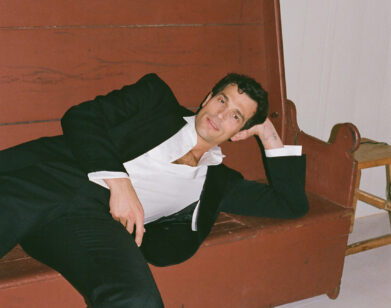David Vann Digs In

ABOVE: DAVID VANN. PHOTO COURTESY OF DIANA MATAR
Enlightenment can be dangerous. In David Vann’s novel Dirt (Harper Collins), protagonist Galen, a 22-year-old bulimic vegetarian, yearns to exist on the astral plane. To escape his overbearing mother, increasingly demented grandmother, caustic aunt, and nymphomaniac cousin, Galen turns to meditation—which become increasingly violent. On a family vacation to a remote cabin in the Sierras, Galen’s New Age philosophy is sorely tested when tensions over inheritance money, a history of abuse, and sexual frustrations burst. Vann writes creepy, beautiful, and lonely scenes of a tortured young man trying to make sense of his crazy world. Galen is a perfect protagonist, by turns dark, sexy and tragic, suffocating while he tries to transcend his everyday life.
We spoke with Vann about his own New Age background, walking on fire, bizarre family dynamics, the normality of craziness, and if it’s possible to rise above it all (in an out-of-body way).
ROYAL YOUNG: I want to talk about the personal tics people have that drive us crazy.
DAVID VANN: When I was in high school, I was fully New Age. I was completely psycho. I was a true believer. I used to fire-walk and help tend the fire and such. I taught relaxation and meditation workshops. I tried to walk on water over and over, crashing into hot tubs and lakes with my arms out. I can’t think of it without laughing.
YOUNG: Where did your belief come from?
VANN: It actually came from my mother, which is the opposite of what happens in the book. In the book, the mother is not New Age and looks on her son’s beliefs with the utmost discouragement. But in real life, my mother and my godmother were both New Age, and I was thinking about becoming a mystic instead of going to college. I think, in a way, this was all because of my father’s suicide when I was 13. In a way, New Age was a kind of therapy, trying to find some sort of healing. Almost everyone interested in something like that of course has problems. That’s why you become interested in it. So you end up hanging out with a bunch of freaks. It’s just inevitable. In every kind of therapy, religious or cult situation everyone has a problem, otherwise they wouldn’t be there.
YOUNG: Do you think that at the time, being around people who had problems made yours seem more bearable?
VANN: Yeah, the whole thing was great. I really enjoyed New Age. But it made me incredibly selfish.
YOUNG: What do you mean?
VANN: Because it’s about how other people in the world aren’t essentially real. They come into your life to teach you lessons, but don’t have any real substance. It’s better to live in an animated world, in which you’re the center, and it was sad to leave that. It was a bummer to not have those things anymore.
YOUNG: What caused you to lose them?
VANN: I went to college and took a history of science class, which was the main thing that deprogrammed me. I also had a religious studies class, which was heavy theory. Having to describe religion from an anthropological approach and trying to defend pseudo-science, which is what I had been practicing, the combo of those two knocked me right out of any belief. Since, I’ve never been able to believe in any kind of god or religion, which is very sad because it means I am a pointless nothing in a pointless universe. That is so much sadder than when I used to live in an animated universe, of which I was the center. That was fun.
YOUNG: Certainly the fire-walking sounds like a lot of fun.
VANN: The fire-walking was great, because you actually feel the coals under your feet. You feel your feet crunching them. You can feel the heat in a way, but you’re also untouched by it. It’s so strange.
YOUNG: How do you think that works?
VANN: There are different explanations. The common one is that everyone tends to stand on grass before they walk across fire and usually the grass is damp from being hosed down or dew. So it takes awhile for the water on your feet to evaporate. And that water shields you from burning. But half of the people get burned, including the teacher, who would get burned every night. But she was making so much money, she would keep doing it. I was a true believer. I was as psycho as they come, and I didn’t get burned at all. I would have been shocked if I had. So I don’t think it can be totally explained.
YOUNG: I want to talk about parents who treat their children more like spouses. Where does that relationship dynamic come from?
VANN: This book is going to get me in big trouble with my mother. It has some true parts, but everything that happens is fictional. But, I certainly felt that I was a kind of replacement spouse for my mother after my father died and she didn’t remarry. Not in any kind of creepy sexual way. But she wanted someone to share her day with, talk with and especially dream with, someone who could help her imagine what the future would be. Which is really something spouses do with each other. A parent who needs or demands to do that with a child, I think is inappropriate. But in fiction, it becomes monstrous.
YOUNG: It’s interesting to me that it seems like you had a support system through all of this, where Galen, the main character in the book, is so alone.
VANN: Yeah, he is really alone. This book gets closer to Greek tragedy. There are only five characters, it happens in about 10 days, mostly in two locations. There’s a real isolation. The whole rest of the world has been cut off. Which mirrors the philosophy that there are no other people and the rest of the world isn’t real. There is tremendous pressure put on Galen and his mother.
YOUNG: We do also have pressure in real life, especially in relationships, when you feel like you can’t tell anyone else about the things in your life, or in your relationships. In the book, being locked in such an intense family struggle where there is no outside mediator or help, things become so out of control.
VANN: Yes, there’s a sort of normality of craziness.
YOUNG: What happens when we ignore our bodies? To what degree can they become prisons?
VANN: Galen’s body is central in the book. He denies it food, he’s very ambivalent about sexuality, he feels his body isn’t real, that it’s a shell. What really interested me is the philosophy affecting the body in a very dangerous way.
YOUNG: Is transcendence a myth? How do we find peace?
VANN: Although I don’t believe we transcend, I still believe in the process. I don’t think the romantic ideal of getting back to a mind of innocence is possible. But there is some tremendous relief and freedom in the corrosive process of burning everything away.
DIRT IS OUT NOW.






